|
June 23, 2007
WOMEN OF COSTA RICA ORGANIZE TO STOP CAFTA
& CALL FOR SOLIDARITY FROM US SOCIAL
FORUM
By Margaret Thompson
&
María Suárez
Despite enormous
pressure from the Costa Rican and US governments, Costa Rica
is the only Central American country that has not ratified
CAFTA -- the Central American Free Trade Agreement.
Heated debate and
a growing social and popular grassroots movement, joined by former presidents, First Ladies,
and former government officials in opposition to the treaty have
resulted in a
call for a public referendum in October of this year. Broad
resistance to CAFTA in Costa Rica is also evident in recent public opinion
polls.
FIRE will be taking to the
US Social Forum a Costa Rican women´s initiative calling for
solidarity in their resistance to CAFTA. The initiative will bring to the Forum
the “Quilt of our Dreams” where women from the U.S. can
paint or write their messages of solidarity with women in Central
America.
|
Women´s organizations in Costa Rica have created the
coalition "Women Against CAFTA" (Mujeres Contra el TLC)
to mobilize for the NO vote on the referendum. They
reject CAFTA because of its impact in eroding the national
Constitution, which is based on a social and political
framework that emphasizes a State protector of human rights,
a participatory democracy and a social services
system involving the collective ownership of the commons
(environment, water, electricity, airwaves and
telecommunications). If ratified, CAFTA would
override the Constitution and lead to privatization of the
commons.
|
What
YOU can do:
*Look for FIRE with the anti-CAFTA banner at the
Social Forum and write a message
*Write to FIRE with a message of solidarity and we
will add it to the banner
*Write
to your US Congressional representatives and ask
them to oppose CAFTA in its current form |
|
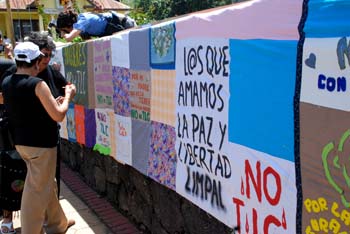
Women contribute to banner
during rally at constitutional court |
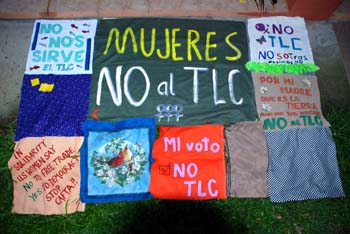
Banner by "Women Against CAFTA" |
Costa Rica as an Endangered Species
"Our country is an endangered species," stated Maria Suárez
and Guadalupe Urbina of Costa Rica, when they visited the
Global Fund for Women in San Francisco last February. “We
need a population that is engaged to save it. Much of what
has made Costa Rica a role model for democracy could be
placed at risk because of the Central American Free Trade
Agreement (CAFTA) and other economic policies.”
|
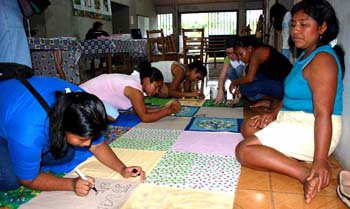
BriBri indigenous women create
their part of the banner |
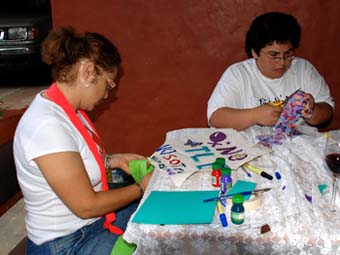
Women Against CAFTA Coalition
creating banner |
Sixty years ago, after a revolution to
overthrow the dictatorship of Tinoco, Costa Rica made the
decision to dismantle the army. At that time, the leaders
also created a social system dedicated to providing services
for people and protecting human rights. In addition, Costa
Rica safeguarded the “commons”, which includes the
environment (of which 60 percent is protected), and the
notion that electricity, telecommunications and water belong
to the society, and should not be privatized. Costa Rica
developed a constitution and political process that
established a space for people to work together to improve
their nation. This is what has allowed the women's movement
to achieve constitutional amendments that protect women's
rights.
Impact of CAFTA & Neoliberal Economic Policies on Women
Reports from
Estado de la Nacion
(State of the Nation), and on Human Development from the
UNDP (UN Development Program) show women’s growing
impoverishment or "feminization of poverty" as a result of neo-liberal policies,
including those emphasized in CAFTA. The reasons for
this are that women have always been the "poorest of the
poor," but increased privatization has led to higher health
and education costs,
such that a
growing number of families cannot afford proper medical
care, nor to send their children to school. And it is the
women who take on the extra tasks as substitute nurses,
caretakers or teachers, often in addition to working at paid
jobs.
Cuts in public
spending have led to elimination of state jobs, particularly
those held by women, and many end up in private sector
service jobs with low pay, few benefits and no job security.
Women are more likely to put themselves last, focusing more
on their families when it comes to limited availability of
food, education, and health care, and so are far more likely
to be malnourished, illiterate, and have chronic health
problems left untreated. In addition, declines in economic
prosperity have contributed to a deterioration of social
conditions, with widespread increases in crime and also
violence, particularly against women.
CAFTA and
neoliberal economic policies also have a devastating impact
on the environment, with greater emphasis on agricultural
expert production which has provided jobs but has also led
to greater pollution and environmental damage.
Bananas, vegetables and flowers, and coffee production all
require enormous amounts of fertilizer and pesticides, all
of which may contribute to health and fertility problems
among workers and nearby residents, and particularly women.
Growing Grassroots Opposition to CAFTA
CAFTA is a free trade agreement with the United States that
according to Eva Carazo Vargas, a trade and agricultural
analyst with the International Relations Center (IRC)
Americas Program, is "part of the Bush Administration's
strategy to bilaterally impose a dependent free-trade
regime, given its failure
to achieve its objectives in multilateral forums such as the
World Trade Organization or the Free Trade Area of the
Americas (FTAA)." But the negotiations were closed to
the public,
which has triggered demands for greater public involvement
and dialogue as the Legislative Assembly debates a vote on
whether to ratify CAFTA in order for it to take effect.
|
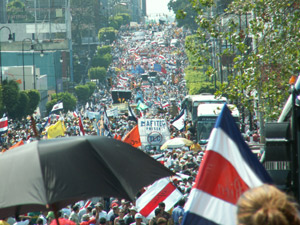
|
The
struggle over CAFTA has generated an enormous grassroots
social and popular movement with hundreds of forums and
meetings organized to inform people and encourage dialogue
and debate. Likewise, tens of thousands of people have
joined street demonstrations in opposition to CAFTA,
representing a wide diversity of groups such as the
coalition of "Women Against CAFTA", teachers, unions,
indigenous, environmentalist, student, academic, religious
and cultural groups, cooperatives, business and politicians.
|
Opposition to CAFTA is growing, despite millions of dollars
spent by the Arias administration in ongoing media campaigns
funded by large corporations and private pro-CAFTA
foundation money, that include tactics ranging from promises
of great economic benefits and half a million new jobs, to
fear tactics about the commercial repercussions against
Costa Rican industries and trade by the United States should
the treaty be rejected. But according to Carazo,
"The
Free Trade Agreement of the Americas (FTA) offers Costa Rica
practically no additional benefit aside from those it
already has in terms of trade with the United States, and a
positive impact on employment has been belied by technical
projected impact models."
The country is now
awaiting the results of a constitutional challenge against
CAFTA with the Sala IV (Constitutional Court), because the
free trade agreement would override the Costa Rican
constitution in application of trade regulations.
A legal decision is expected in mid-July. In addition,
the public will vote on the referendum on the treaty in
October.
Opposition to
CAFTA has also found its way in the U.S. Congress and
Democrat Majority disagrees with some of its clauses also.
Both Costa Rican and USA citizens and opposing parties are
calling for a total revision of the Treaty under discussion,
in order to guarantee protection of rights in both
countries.
Some of this report is based on the blog article, "Maria
Suarez on FIRE" in the Global
Fund for Women newsletter from April 2007 (http://www.globalfundforwomen.org/cms/content/blogcategory/106/272/)
and also the article, "Why Costa Rica is Opposed to CAFTA"
by Eva Carazo Vargas of the IRC Americas Program at:
www.americas.irc-online.org .
|